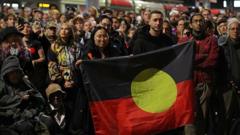Julius Malema, leader of South Africa's Economic Freedom Fighters party, was the focal point of a controversial meeting between President Trump and President Cyril Ramaphosa. Trump’s remarks referencing Malema's incendiary calls for land redistribution and alleged violence have raised significant dialogue regarding race relations and politics in both nations.
Unpacking the Controversy: Julius Malema's Impact on U.S.-South Africa Relations

Unpacking the Controversy: Julius Malema's Impact on U.S.-South Africa Relations
A recent Oval Office meeting sparked tensions as President Trump highlighted South African politician Julius Malema's past remarks amidst discussions about race and land ownership.
Julius Malema, the 44-year-old leader of South Africa's Economic Freedom Fighters party, was notably absent during a recent meeting held in the Oval Office between President Trump and South African President Cyril Ramaphosa. Despite his physical absence, Malema's presence was felt as the White House played a video montage of his controversial apartheid-era chants, setting a charged atmosphere for the discussions.
Trump’s meeting with Ramaphosa raised eyebrows due to the underlying tensions around race and land ownership in South Africa. The Economic Freedom Fighters, a party founded by Malema over a decade ago, has been vocal about its agenda for the redistribution of land owned by white farmers to Black South Africans. This stance has made Malema a polarizing figure, especially since his party garnered less than 10 percent of votes in the 2024 elections.
In response to the White House meeting, Malema took to social media platform X to express his views, stating, "A group of older men meet in Washington to gossip about me. No significant amount of intelligence evidence has been produced about white genocide." His comments were reminiscent of previous rallies where he ignited controversy by chanting "Kill the Boer," a phrase aimed at Afrikaans-speaking farmers, a reminder of South Africa's complex and painful history.
The implication of Malema’s rhetoric has only intensified conversations around race relations in South Africa, especially in the context of Trump's remarks. As these political narratives unfold, the U.S.-South Africa relations continue to be examined through the lens of historical injustices and contemporary calls for equity.



















